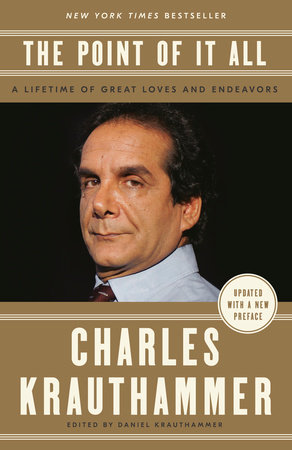Excerpt
The Point of It All
PART I
WHAT A PIECE OF WORK IS MAN
CHAPTER 1
LIFE WELL LIVED
Reveries of a Newborn Father
Three weeks ago Daniel Pierre Krauthammer, our first, entered the world. It was a noisy and boisterous entry, as befits a 10-pound Krauthammer. It has been just as noisy and boisterous since. I had been warned by friend and foe that life would never be the same. They were right.
Of course, like all exhausted newborn fathers, I am just looking for sympathy. It is my wife, Robyn, whose life has been fully merged with his, in a symbiosis profound and delicate. His sucking, did you know, causes the uterus to contract and helps shrink it back to normal size. Twenty days old, and he is healing her.
What she does for him, of course, would not fit in a month’s worth of columns. What do I do? It seems my job is to father, a verb which must count as one of the age’s more inventive creations. How exactly to father? I don’t really know. The women’s movement, to which the idea owes its currency, is right to insist that the father do more.
But more of what? I have been asking myself that lately as I rock him and hold him and speak to him in the gravest of tones. But we both know, we all three know, the truth: Nature has seen to it that anything I can do, she can do better. Mine is literally a holding action.
Of course, the imperative to father is only the last of the social conventions one must bend to on the road to parenting. (I am learning the language.) First, there is Lamaze, the classes that teach you to be natural. Robyn does not fancy oxymorons. And I, as a former psychiatrist, know a placebo when I see one. We said no to Lamaze.
We said yes to the Volvo. In fact, on the Volvo we went all the way. We got the station wagon with roof rack: the ultimate yuppie conveyance. “For safety reasons only,” I explain to friends, a protest that meets with knowing smiles.
Finally, there is the supreme modern convention: the now-absolute requirement that father, in surgical gear, attend the birth. Of course, you don’t have to if you don’t want to. You can, if you wish, wait outside, like Dagwood Bumstead, pacing and smoking and fretting until it’s over. You have the perfect right to betray your wife, spurn your child and disgrace your sex. It’s a free country.
The transformation of expectant father from nuisance—packed off to boil water, find towels and generally get out of the way— to conscripted co-producer of the birth epic is one of the anthropological wonders of the age. And on the whole, apart from the coercion, a good thing. Father’s presence serves two purposes. One is to reduce the anguish of the mother. The other is to increase the anguish of the father. Both seem to me laudable goals. It makes up a bit for the extraordinarily unfair imbalance of suffering that attends childbirth.
Thank God, the new convention does not (yet) command fathers to attend a caesarean delivery. I speak from experience. Robyn needed a caesarean and, hoping I could comfort her, I was with her in the operating room. I was not looking for a Maslovian peak-experience, the kind of epiphany that reputedly accompanies the moment of birth. I was doubtful, not just because of my usual skepticism, but because of my previous career. In medical school, I had assisted at several births, including a couple of caesareans, and always had trouble seeing the poetry for the blood.
There was little poetry this time either. It was an agonizing hour for her, and for me. (Daniel did very well.) The poetry came afterward, in the recovery room, where I found Daniel asleep in Robyn’s arms.
It has been poetry and reverie ever since. Having a child, I discovered, makes you dream again and, at the same time, makes the dreams utterly real. Lately I have been dreaming of the future. I find entirely new meaning in what we in Washington call “out-years.” Take 1989, the year the budget deficit comes down to $100 billion. A time far, far away . . . until I figured it is the year when we retire Daniel’s Pampers. A manageable deficit, only a few thousand nappy changes away.
Stranger years, years of exotic immensity, years that till now had meaning to Arthur C. Clarke only, become utterly mundane. 2001, the year of the mystical obelisk, and Daniel should be getting his learner’s permit. 2010, the obelisk returns and Daniel is looking for a job. 2050, a year of unimaginable distance: his first Social Security check.
“Checks? Social Security?” my friend Pepe interrupts. “Where’s your imagination, man? They’ll all be memories. Think big. 2050: the year he takes a sabbatical on Saturn.”
I’m thinking small. I gaze at his body, so perfectly formed, so perfectly innocent. It has yet to be written on. I look at his knee and wonder where will be the little mark that records his first too-hard slide into second base.
The Washington Post, June 28, 1985




